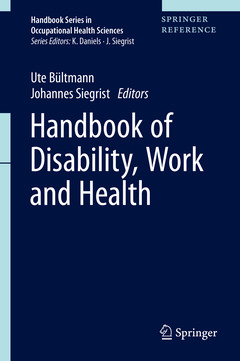Description
Handbook of Disability, Work and Health, 1st ed. 2020
Handbook Series in Occupational Health Sciences Series, Vol. 1
Language: English
Subjects for Handbook of Disability, Work and Health:
Keywords
occupational injuries; occupational rehabilitation; working with chronic disease; mental health and disability; physical health and disability; rehabilitation services; work stress and chronic diseases; training of capabilities; prevention of work disability; integrative labor market policies; occupational hazards; disability pensions; work stress prevention; rehabilitation psychology
687 p. · 15.5x23.5 cm · Hardback
Description
/li>Contents
/li>Biography
/li>Comment
/li>
As a further innovative feature, this handbook integrates biomedical, psychological, and sociological knowledge on major aspects of the links between work, health and disability. It is therefore of interest to students and professionals in related disciplines, as well as for stakeholders involved in the prevention of work disability and rehabilitation into paid work. In times of an increasingly aging work force with elevated risks of reduced health and work functioning, this knowledge can contribute to turning the threats associated with disability into opportunities. This handbook supports the overall aim of enabling persons with (chronic) health problems and disability to participate in work and social life.
Preface by the Editors.- Section I: Occupational hazards, impaired health and disability risk. Section Editor: Johannes Siegrist.- A. General issues and challenges.- 1. The changing nature of work and employment in developed countries; Werner Eichhorst, IZA, Bonn, Germany.- 2. Trends of work and employment in rapidly developing countries; Arne Kalleberg, University of Chapel Hill, NC, USA.- 3. Trajectories from work to early exit from labour market: theoretical concepts; Hans Martin Hasselhorn, University of Wuppertal, Germany.- 4. Occupational hazards as determinants of early exit from labour market: conceptual and methodological approaches; Alex Burdorf, Erasmus Medical Center, Rotterdam, The Netherlands.- 5. Disability pensions: regulatory principles and variations according to welfare policies; Anne Juvani and Jaana Pentti , Finnish Institute of Occupational Health, Turku, Finland.- 6. Policies of reducing the burden of occupational hazards and disability pensions: overviewand critical appraisal; Espen Dahl and Johan Fritzell, Oslo University, Norway and Karolinska Institute, Stockholm, Sweden.- B. Occupational hazards and main outcomes of impaired health.- 7. Occupational injuries: major trends in developed countries; Paivi Hämälainen, VTT Technical Research Centre, Tampere, Finland.- 8. Occupational injuries in rapidly developing countries; Jukka Takala, Workplace Safety and Health Institute Singapore.- 9. Chemical, physical and biological hazards and occupational diseases: cancer; Jack Siemiatycki, University of Montreal, Canada.- 10. Chemical, physical and biological hazards and respiratory diseases; Manolis Kogevinas, Research Centre of Environmental Epidemiology (CREAL), Barcelona, Spain.- 11. Occupational (physical and psychosocial) determinants of musculoskeletal disorders; Annette Leclerc, INSERM, Paris.- 12 Occupational (physical and psychosocial) determinants of cardiovascular disorders; Töres Theorell, Stockholm University, Stockholm,Sweden.- 13. Occupational (physical and psychosocial) determinants of affective disorders; Reiner Rugulies, University of Copenhagen, Denmark.- 14. Occupational (physical and psychosocial) determinants of cognitive decline and dementia; Erika Sabbath and Claudine Berr, Boston University, Boston, USA and University of Montpellier, France.- 15. Occupational (physical and psychosocial) determinants of health-adverse behaviours (including overweight, smoking, alcohol, physical inactivity); Solja T. Nyberg, Finnish Institute of Occupational Health, Helsinki, Finland.- C. Prevention strategies and challenges.- 16. A critical role of occupational health and safety services; Peter Schnall, University of California, Irvine, USA.- 17. Surveillance, monitoring and evaluation: regulatory and voluntary approaches; Stavroula Leka, University of Nottingham, United Kingdom.- 18. Health-promoting work: strategies and models of best practice; Antony LaMontagne, Deakin University, Australia.- 19. Impactof national labour and social policies; Claire Bambra, Durham University, United Kingdom.- 20. Challenges at international/global level; Ronald Labonté, University of Montreal, Canada.- Section II: Access/return to work of persons with chronic diseases or disabilities; Section Editor Ute Bültmann.- A. Key issues.- 1. A human rights perspective on social participation; Tom Shakespeare, University of East Anglia, United Kingdom.- 2. Legal aspects of access/return to work; Katherine Lippel and Genevieve Grant, University of Ottawa, Canada and Monash University, Australia.- 3. Economic aspects of access/return to work Chris McLeod, University of British Columbia, Canada.- 4. Impact of distinct national labour and social policies; Christopher Prinz, OECD, France.- 5. Employment as a key rehabilitation outcome; Kerstin Ekberg and Merete Labrioloa, University of Linköping, Sweden and University of Aarhus, Denmark.- 6. Socio-environmental and psychological barriers to employment; Sandra Brouwer and Cecile Boot, University of Groningen and VU University Amsterdam, The Netherlands.- B. Determinants and outcomes of access/return to work in major disabilities or chronic diseases.- 7. Cancer; Anja Mehnert and Angela de Boer, University of Leipzig, Germany and University of Amsterdam, The Netherlands.- 8. Spinal cord injury; Jan Reinhardt and Marcel Post, Swiss Paraplegic Research, Nottwil, Switzerland and Utrecht University, The Netherlands.- 9. Cardiovascular disease; Angelique de Rijk, Maastricht University, The Netherlands.- 10. Affective disorders; Silje Endresen Reme, University of Bergen, Norway.- 11. Musculoskeletal disorders; Dwayne van Eerd and Dorca Beaton, Institute for Work & Health, Toronto, Canada.- 12. Addictive disorders; Ulrich John, University of Greifswald, Germany.- 13. Mental disabilities; Marc Corbiere, University of Quebec, Montreal, Canada.- 14. Multi-morbid conditions; George Declos and Monica Ubalde-Lopez, University of Houston, Texas, USA and University of Pompeu Fabre, Barcelona, Spain.- C. Rehabilitation strategies and policy challenges.- 15. Investing in medical and vocational rehabilitation services; Mathias Bethge and Christoph Gutenbrunner, University of Lübeck and MHH Hannover, Germany.- 16. Strengthening Individual Placement and Support Models, stepwise return to work and employer engagement; Gary Bond, The Dartmouth Institute, USA.- 17. Implementing best practice models of return to work; Bill Shaw and Vicky Kristmas, Hoptinkton, USA and Lakehed University, Canada.- 18. Prioritizing training/retraining of capabilities according to need; Reuben Escorpizo, University of Vermont, USA.- 19. Reducing societal (discrimination) and environmental barriers to work; Jerome Bickenbach and Per von Groote, Swiss Paraplegic Research, Nottwil, Switzerland.- 20. Investing in integrative, active labour market policies, including fair social protection; Olle Lundberg, Stockholm University, Sweden; Subject Index.
These books may interest you

Handbook on Ageing with Disability 311.56 €


